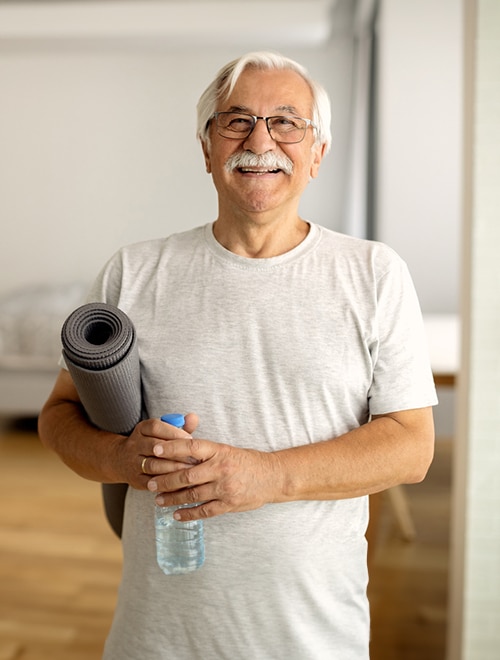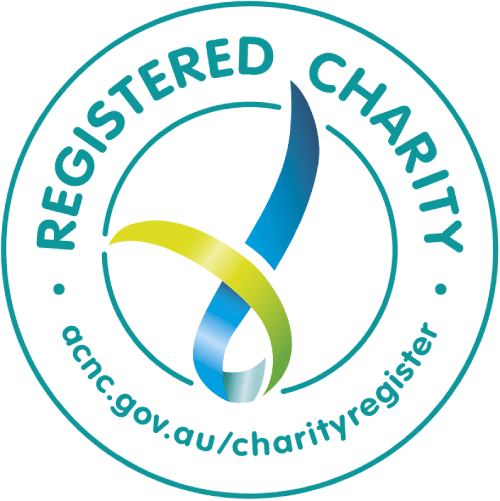- 7 min read
Staying healthy during your prostate cancer experience
Eating well and focusing on a healthy lifestyle is important during your prostate cancer experience. Taking care of yourself can help you cope better with any emotional and physical challenges and can help keep your mind and body strong and resilient.
There are many ways to improve your diet and lifestyle when you have been diagnosed with or are being treated for prostate cancer. Follow the links below to learn more about:
- Eating a balanced and healthy diet
- Maintaining a healthy weight
- Avoiding unhealthy lifestyle habits
- Getting enough sleep
For a healthy lifestyle it’s also important to exercise regularly and look after your mental wellbeing. The links below provide you with more information:
What is a balanced and healthy diet and why is it important?
A healthy, balanced diet provides a range of vitamins, minerals and other nutrients to support your body and energy levels and improve your vitality, strength and wellbeing. This is especially important before and during your treatment, as healthy eating has been shown to result in better outcomes and helps with recovery after procedures, such as surgery.
Eating a healthy diet rich in fibre and nutrients can also prevent or help with digestive complaints, such as constipation and diarrhoea. It can also reduce your risk of other diseases, such as heart disease and diabetes.
What is a good healthy eating plan?
For a healthy balanced diet, use the following guidelines:
- Eat mostly plant and wholegrain, high fibre foods (especially if you have constipation)
- Eat a wide range of vegetables and fresh fruit daily
- Try various wholegrains (brown rice, millet, quinoa, barley, buckwheat, freekeh, oats and polenta)
- Eat wholegrain bread, pasta and cereals (limit commercial cereals high in sugar)
- Add legumes such as lentils, chickpeas, kidney beans into your diet by adding to casseroles, soups, pasta sauces or salads, making hummus or eating them within other meals (for example, having baked beans on wholegrain toast)
- Eat a handful of mixed, unsalted nuts and seeds every day (for example, walnuts, pecans, almonds, sunflower and pumpkin seeds)
- Eat moderate amounts of quality, lean meat and fish
- Limit processed meats (for example, sausages, deli meats and bacon)
- Try tofu or tempeh instead of meat in some of your meals (stir fry to create an Asian dish)
- Include calcium and vitamin D rich foods in your diet to strengthen your bones, especially if you are on hormone therapy, which may affect your bone health
- Calcium rich foods include cheese, milk, yoghurt, tinned sardines, tofu and broccoli
- Vitamin D rich foods include oily fish, egg yolk, liver
- You can also make vitamin D in your skin from sunlight and take it in a supplement form
- Eat home-cooked food that you, a family member or friend can prepare using freshly bought or grown food
- Avoid processed foods, biscuits, cakes, pies or other pre made supermarket meals, especially if you want to lose weight
- Stay hydrated by drinking water regularly throughout the day
- Drink at least 1 to 2 litres of water, this is especially important if you are prone to or have constipation
- A glass of warm liquid when you first get up in the morning may also help with constipation
- Avoid or limit sugary drinks (soft drinks and fruit juice)
- Limit alcohol
- If you have diarrhoea, water and diluted cordials are better hydrating fluids than high sugar drinks, alcohol, strong caffeine or very hot/cold fluids, which may worsen your diarrhoea
- If your bladder is irritated, including due to treatment, avoid caffeine (tea, coffee, cola drinks), alcohol, citrus fruits and juices, and drinks with artificial sweeteners
- Limit your salt intake, especially if you are at risk of heart disease
- Avoid highly spiced foods, if they upset your digestion, have diarrhoea or irritated bladder symptoms or suffer from hot flushes due to hormone therapy
Remember to speak to your healthcare team if you are experiencing side effects from treatment that affect your appetite, such as nausea, vomiting, diarrhoea, constipation, taste changes or weight loss. You can also learn more about any treatments you are having and the possible side effects by following the link to: Treatment & Side Effects.
Always tell your doctor if you are making any changes to your diet. If you have diabetes, ensure your blood glucose levels are regulated. Unstable blood glucose levels can affect your appetite and energy levels and can cause urinary issues.
What do you do when you need help with planning a healthy diet?
Your nutrition needs can change depending on your cancer stage and treatment. If you need help, talk to your healthcare team or reach out to a PCFA nurse on 1800 22 00 99 for advice or a referral to a dietitian. An accredited practising dietitian (APD) can provide diet advice and recommend individual eating plans for you. You can also find a dietitian on the Dietitians Australia website at www.dietitiansaustralia.org. au/find-an-apd
How do you maintain a healthy weight with diet and lifestyle?
Getting to or maintaining your healthy weight is important as you age and when you have prostate cancer. This is especially important if you are undergoing treatment, have a poor appetite and are losing or gaining weight unintentionally.
When combined with physical activity, a nutritious diet can help you achieve a healthy weight and maintain muscle mass. Evidence shows that maintaining a healthy weight reduces the risk of cancer, including prostate cancer, and can support better treatment outcomes.
If you are losing weight but it isn’t intentional, try to include the following into your healthy diet plan:
- Eat small, frequent meals over the day (3 main meals and 3 snacks)
- Include nutritious, high-protein foods and healthy fats regularly, such as:
- Unsalted nuts and seeds
- Avocado
- Lentils and legumes (baked beans, chickpeas, kidney beans)
- Yoghurt, cheese and milk
- Smoothies and milkshakes
- Hummus
- Nut butter (peanut butter, cashew butter, etc)
- Eggs
- Olive oil
- Poultry/ fish/ quality lean red meat
Being overweight can affect your treatment outcomes, increase your risk of other diseases (such as heart disease and diabetes) and put extra pressure on your bladder, which can increase urinary symptoms during or after treatment. Some men gain weight in the first 12 months of starting hormone therapy.
Try to eat a healthy diet, reduce your portion sizes and exercise regularly. For more information on serving sizes, visit www.eatforhealth.gov.au. However, don’t expect to lose weight quickly or weigh yourself every day, as this can be disappointing. Let your clothes be your guide and measure your waist every few weeks to monitor your progress.
If you find that you are having trouble losing weight, or if you feel that you are not coping with any changes to your body shape during or after treatment, contact your healthcare team or call a PCFA nurse on 1800 22 00 99 for suggestions. They’ll be able to give you advice on how you can adjust your lifestyle or diet.
What are the lifestyle habits you should avoid?
Some men may turn to alcohol, cigarettes, drugs, overeating or gambling to help them cope with stressful situations. These can give you relief for a while, but they can also harm you physically, mentally and often financially. If you are receiving treatment, some of these habits may affect how well your cancer treatment works.
If you find you are starting to rely on any of these, then it’s important to talk to someone in your healthcare team or a PCFA nurse to discuss whether you need professional support.
If you are already smoking, seek help to quit. Aside from its effects on your overall health, smoking acts as an irritant to the bladder and a smoker’s cough can weaken your pelvic floor muscles. Your pelvic floor is important for maintaining control of your urination as you age and before and after surgery or radiation therapy. For more information on pelvic floor-friendly exercises, visit www.pelvicfloorfirst.org.au. A continence nurse or continence physiotherapist can also advise you – ask your healthcare team for a referral.
Follow the link to learn how to perform pelvic floor exercises correctly: Pre & Rehabilitation
Smoking also slows down the healing process, and there is a direct relationship between this habit and thinning bones. Quitting at any age may help reduce the amount of bone you lose, while quitting even 24 hours before any surgery may help with recovery and reduce the chance of developing chest and circulation problems after your surgery.
If you need help to quit smoking, talk with your GP or a member of your healthcare team or call the Quitline on 13 78 48.
How do you get enough sleep and why is it important?
Getting enough sleep is very important to help you cope with prostate cancer, both emotionally and physically. If you are sleep deprived, your brain and body can’t function to full capacity, and it may affect your mood or ability to think clearly or concentrate.
But it can be hard to sleep if you have pain, side effects or worries. You might not be getting as much exercise as you’re used to either, which can make sleep harder.
You can help improve your sleep by:
- Getting into a regular bedtime routine – start bedtime habits like writing in your diary, listening to music, taking a bath or doing other relaxing activities before bed
- Going to bed at the same time each night and getting up at the same time each morning
- Making sure your room is cool, dark and quiet
- Limiting alcohol, caffeine and big meals in the evening (but do not go to bed hungry)
Exercising during the day – try to relax in the evening
You can find out more about exercise and supporting your mental wellbeing by following the links below:
Physical Activity
Psychological Wellbeing
Side effects from treatments can affect your health and wellbeing. Learn more by following the link to: Side Effects
If you need support, you can also talk to your partner, family members, a friend or a prostate cancer support group, or reach out to your GP or a member of your healthcare team. Find out about the support available to you by following the link to: PCFA Nursing & Support.
Key Points
- Eating well, following a healthy lifestyle, avoiding unhealthy habits and getting enough sleep are important for all men with or recovering from prostate cancer
- Looking after your mental wellbeing and exercising is also an important part of self-care during your prostate cancer experience
- Eating a healthy balanced diet of home-cooked foods consisting of lean meats, wholegrain foods, legumes, nuts, seeds, fruits, and foods rich in calcium and vitamin D is beneficial for health and wellbeing
- It is also important to stay hydrated with 1 to 2 litres if water a day and avoid sugary drinks
- Your healthcare team, a PCFA nurse or dietitian can help you with diet plans or resources – remember to always tell your doctor before changing your diet
- Being a healthy weight is beneficial for reducing risk of other diseases and can improve treatment outcomes
- Avoid relying on unhealthy habits to help you cope, such as alcohol, drugs, overeating or gambling – seek help if you need it
- Getting adequate sleep helps with coping and resilience – there are many tips such as having a good bedtime routine to help you sleep better






